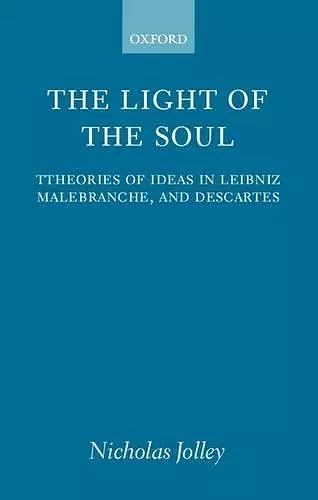The Light of the Soul
Theories of Ideas in Leibniz, Malebranche, and Descartes
Format:Paperback
Publisher:Oxford University Press
Published:8th Oct '98
Currently unavailable, and unfortunately no date known when it will be back

The concept of an idea plays a central role in seventeenth-century theories of mind and knowledge. However, philosophers of the period were seriously divided over the nature of ideas. The Light of the Soul examines the important but neglected debate on this issue between Leibniz, Malebranche, and Descartes. In reaction to Descartes, Malebranche argues that ideas are not mental but abstract, logical entities. Leibniz in turn replies to Malebranche by reclaiming ideas for psychology. Nicholas Jolley explores the theological dimension of the debate by showing how the three philosophers make use of biblical and patristic teaching. The debate has important implications for such major issues in early modern philosophy as innate ideas, self-knowledge, scepticism, the mind-body problem, and the creation of the eternal truths. Jolley goes on to consider the relevance of the seventeenth-century controversy to modern discussions of the relation between logic and psychology. 'This is an excellent book about a variety of themes in seventeenth-century philosophy . . . an engaging and stimulating tour of a series of fascinating philosophical debates which constitute central dimensions of the seventeenth-century philosophical tradition. . . . Jolley has a fine philosophical sense, an excellent knowledge of the texts, and a rich appreciation of the secondary literature.' Michael L. Morgan, Review of Metaphysics 'Jolley has written a rich and useful book.Its concerns are important and he presents them in a remarkably accessible fashion. . . . Very seldom does a book like this appear that will be of serious interest both to the most advanced, sophisticated researchers in the field and to those with only passing knowledge of the basic texts ... It is an engaging book, in both senses of the term. Its style and method of argument are not only prepossessing, but they also draw one into the dialectic, and in a philosophically productive way.' Thomas M. Lennon, Canadian Philosophical Reviews 'careful and perceptive . . . lucid and wide-ranging' John Cottingham, Times Literary Supplement 'A significant study of a central topic in modern philosophy . . . Without losing sight of his central theme, Jolley manages to illuminate a host of related topics in epistemology and the philosophy of mind, and succeeds quite admirably in offering a philosophically stimulating, historically rich discussion of the nature of ideas. Consequently, this book should be purchased by every academic library supporting undergraduate degree programs in philosophy.' C. J. Shields, Choice
`very stimulating and exciting Richard A. Watson
`careful and perceptive study ... lucid and wide-ranging study' Times Literary Supplement
'his lucid and informative book' John Cottingham, University of Reading, Seventeenth Century French Studies, XIII, 1991'
`A significant study of a central topic in modern philosophy ... a philosophically stimulating, historically rich discussion of the nature of ideas.' Choice
`This is an excellent book about a variety of themes in seventeenth-century philosophy ... Jolley does provide something extremely valuable: an engaging and stimulating tour of a series of fascinating philosophical debates which constitute central dimensions of the seventeenth-century philosophical tradition ... Jolley has a fine philosophical sense, an excellent knowledge of the texts, and a rich appreciation of the secondary literature.' Review of Metaphysics
'This is an excellent book about a variety of themes in seventeenth-century philosophy ... Jolley does provide something extremely valuable: an engaging and stimulating tour of a series of fascinating philosophical debates which constitute central dimensions of the seventeenth-century philosophical tradition.' Review of Metaphysics
'Jolley has written a rich and useful book. Its concerns are important and he presents them in a remarkably accessible fashion. However problematic or controversial his claims may be, Jolley makes them clear. Very seldom does a book like this appear that will be of serious interest both to the most advanced, sophisticated researchers in the field and to those with only passing knowledge of the basic texts ... It is an engaging book, in both senses of the term. Its style and method of argument are not only prepossessing, but they also draw one into the dialectic, and in a philosophically productive way.' Thomas M. Lennon, The University of Western Ontario, Canadian Philosophical Reviews, V. XI, No. 5 - V. XII, No. 1 (Oct 91 - Jan 92)
ISBN: 9780198238195
Dimensions: 216mm x 139mm x 13mm
Weight: 290g
220 pages